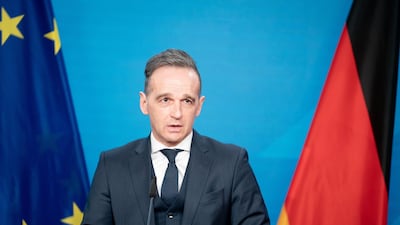Iran is “playing with fire” with its recent breaches of the 2015 nuclear deal, Germany said as ministers from European powers and the US held talks over Tehran on Thursday.
The importance of the transatlantic partnership in dealing with the security, climate, economic, health and other challenges the world faces was also reaffirmed.
Ministers expressed their joint determination to defuse tension in the region and to bring about a swift end to the war in Yemen.
There was also strong condemnation of the recent rocket attacks in Erbil, northern Iraq, and the coup in Myanmar.
The ministers repeated the warning that attacks on US, coalition and Nato forces would not be tolerated
Those present also urged Iran to release all "arbitrarily detained nationals and reunite them with their families".
This included British-Iranian Nazanin Zaghari-Ratcliffe, whose detention is due to expire on March 7.
But it was Iran's increased nuclear activity that drew the most criticism.
German Foreign Minister Heiko Maas said Iran was jeopardising a return to the 2015 nuclear accord with world powers through its actions.
Tehran is suspected of taking another step towards making a nuclear weapon.
"The more pressure is applied, the more difficult it gets to find a political solution," Mr Maas said.
He said negotiations "are being significantly complicated at the moment because Iran obviously does not seek de-escalation but escalation, and this is playing with fire”.
Iran has recently increased production of uranium enriched up to 20 per cent and uranium metal.
This had "no credible civil justification", said the European nations and the US in a joint statement after the meeting.
US Secretary of State Antony Blinken appeared by video at the Paris meeting, which was hosted by French Foreign Minister Jean-Yves Le Drian and included Mr Maas and British Foreign Secretary Dominic Raab.
In 2018, US president Donald Trump withdraw the US from the deal and reimposed sanctions on Iran.
His successor Joe Biden indicated his readiness to return to the agreement, but only if Iran returns to its terms.
Tehran has refused to do so unless the sanctions are lifted.
Last week the three European countries said Tehran was “undermining the opportunity for renewed diplomacy to fully realise the objectives of the [deal]” after its latest breach.
The nuclear deal signed in Vienna in 2015 was based on Iran agreeing to limits on its atomic programme, in exchange for a gradual easing of international sanctions.
The diplomacy is expected to be hugely delicate and could be further derailed by the deadline set under a bill adopted by the Iranian Parliament in December after the killing of top nuclear scientist Mohsen Fakhrizadeh, which Tehran blamed on Israel.
Iran will restrict some UN nuclear agency inspections by February 21 if the US does not lift the sanctions imposed since 2018.
International Atomic Energy Agency chief Rafael Grossi will travel to Tehran on Saturday for talks with authorities to find a solution for continuing inspections in the country, the agency said.
It said that the move would have "a serious impact on the IAEA's verification and monitoring activities in the country".
In Washington, State Department spokesman Ned Price said that Iran should provide "full and timely co-operation" with the IAEA and reverse its recent steps that breached the accord.
The IAEA said last week that Iran had started producing uranium metal, a new breach of the accord, intensifying concerns that it was getting closer to being able to make a nuclear weapon.
"Iran's nuclear programme is growing by the day, as the time it would take to enrich enough uranium for a single nuclear weapon shrinks," said Ali Vaez, Iran director at the International Crisis Group, a think tank formerly run by the new US Iran envoy, Robert Malley.
Iran supreme leader Ayatollah Ali Khamenei oversees the country's nuclear policy but negotiators regard the country's June presidential elections as a time pressure factor.
Hassan Rouhani, the Iranian President, is an advocate of nuclear diplomacy with global powers.
Mr Rouhani is scheduled to step down after serving the maximum two consecutive terms.





